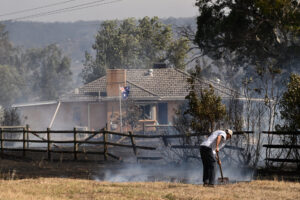The New Face of Climate Denial

Old-fashioned climate change denialism is the risk you run when you hold an international climate conference in a Middle Eastern petrostate and hand the reins to an oil baron, writes Stephen Long, but in practice, is Australia really much better?
Someone should have told the president of COP28 not to say the quiet bit out loud.
Sultan Ahmed Al Jaber is an Emirati politician and energy tsar, CEO of Abu Dhabi National Oil Corporation, the state-owned energy company of the United Arab Emirates.
To say he strayed off script is putting it mildly.
The man presiding over the latest global climate conference in the UAE claimed there is “no science” showing that the world must phase out fossil fuels to restrict global heating to 1.5C.
Then he doubled down, adding that this would “take the world back to the caves.”
Old-fashioned climate change denialism. That’s the risk you run when you hold the COP in a Middle Eastern petrostate and hand the reins to an oil baron.
But as world leaders and COP attendees tut-tut and guffaw, it’s worth asking: how different is what the Sultan said out loud and what big fossil fuel exporting countries – including Australia – are doing in practice?
Sure, the current Australian government isn’t so gauche as to deny the climate science.
But the federal government is supporting a fossil fuel expansion completely at odds with the scientific advice and findings.
In the United States, President Biden’s administration is backing new oil and gas that could vastly increase climate pollution.
Globally, CO2 emissions from fossil fuels hit a record high this year, despite the world’s scientific experts warning that expanding fossil fuel use will cause a global catastrophe.
This is the new face of climate denialism: accept the science, pledge to achieve “net zero” emissions at home, but back a fossil fuel expansion that could turbocharge global emissions.
Australia has more than 100 new fossil fuel projects in the pipeline.
Since May 2022, it has approved 4 new coal mines or mine expansions with 156 million tonnes of lifetime emissions.
Already the world’s third largest fossil fuel exporter, Australia wants to sell even more fossil fuels to the world.
Although Climate and Energy Minister Chris Bowen has committed to ending subsidies for fossil fuel exports, the government is supporting new gas extraction projects with the potential to drastically increase climate pollution.
Consider the Burrup Hub in north-west WA.
Oil and gas giant Woodside leads a group of companies planning giant new gas developments that could produce 6.1 billion tonnes of CO2 across the decades, according to a new study.
That’s roughly 13 times what Australia emits annually.
Resources minister Madeleine King justifies the gas expansion with well-worn industry talking points.
She enthuses about the economic benefits and jobs (in truth, relatively few).
She wields the drug dealer’s defence – if we don’t do it, someone else will.
With foreign affairs minister Penny Wong, she cites regional security, and the apparent need to assuage Japan which has threatened Australia with trade reprisals unless it sates Japan’s appetite for fossil fuel energy.
Above all, with the Opposition’s full support, she mouths the mantra that gas is a “transition fuel” that will displace coal and combat climate change.
Never mind that this is at odds with the science.
In 2019, Woodside paid the CSIRO a tidy sum to examine the “transition fuel” argument.
Despite a repeated back and forth on different drafts, Woodside couldn’t procure a report it liked.
It buried it when the conclusions contradicted the oil and gas giant’s claims.
Australia’s peak scientific agency found that, on most scenarios, sending more Australian gas to Asia would either increase overall emissions or have no net benefit – while discouraging renewable energy.
Only a very high global carbon price combined with a flood of new gas would speed the clean energy transition – yet in this scenario, it’s likely gas would be priced out anyway.
Woodside dismisses the CSIRO’s conclusions as “out of date”.
The gas industry’s “transition fuel” claims also ignore new analysis by Cornell University professor Robert Howarth suggesting that, because of methane leakage, exporting LNG is worse for the climate than burning coal.
“Best case scenario for LNG is worse than coal by 24%, worst case by much more than two-fold,” claims its author. “LNG,” he says, “is a climate disaster.”
In any event, despite the transition talk, Australia is still backing coal exports for as long as there’s a market.
The politicians’ fallback is that dealing with the emissions from exported fossil fuels is someone else’s problem.
Indeed, as far as greenhouse gas accounting rules are concerned, that’s pretty much true.
The trouble is greenhouse gases don’t respect national borders.
America’s Inflation Reduction Act is driving a huge investment in clean energy.
Australia is still experiencing rising emissions, with clever accounting through land use figures papering over the cracks in future projections, though Australia has pledged to underwrite new clean energy investments and decarbonise its electricity grid.
But ultimately, that won’t mean much if fossil fuel exports contribute to increased emissions worldwide or undermine the rapid reduction needed to arrest global warming.
The world is struggling to kick an addiction to fossil fuels. Importing and exporting nations are downplaying and distorting the reality.
Denial stops recovery. In the end, you either change or die.
Between the Lines Newsletter
The biggest stories and the best analysis from the team at the Australia Institute, delivered to your inbox every fortnight.
You might also like
Why a fossil fuel-free COP could put Australia’s bid over the edge
When the medical world hosts a conference on quitting smoking, they don’t invite Phillip Morris, or British American Tobacco along to help “be part of the solution”.
Burning homes and rising premiums: why fossil fuel companies must pay the bill
Another summer, another round of devastation: homes lost, communities evacuated, lives upended.
The kind of hypocrisy that has become so normal in Australian politics it almost slips past unnoticed
Governments say the right things about becoming a ‘renewable energy superpower’ and committing to net zero. But they keep approving new coal and gas projects as if the laws of physics don’t apply to Australia.



